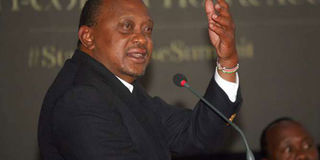It is important to safeguard Judiciary's independence

President Uhuru Kenyatta at the State House Summit on Governance, Anti-Corruption and Accountability at State House in Nairobi on October 18, 2016. PHOTO | EVANS HABIL | NATION MEDIA GROUP
What you need to know:
In my view, President Kenyatta’s rhetoric was not about fighting corruption; it was only meant to signal to the new Chief Justice that he must toe the line drawn by the Executive.
We must not forget the Executive’s failed attempt to accord the President more powers in the appointment of the Chief Justice through amendments to the Judicial Service Act.
The independence of the Judiciary and its ability to protect the rights of citizens is what is under attack here.
What explains President Uhuru Kenyatta’s recent attacks on the Judiciary? Is the President merely expressing his frustrations over the failure of institutions, including the Judiciary, to fight graft? Is there a bigger agenda behind the reproach?
The President’s “anti-Judiciary” rhetoric was started at the State House Summit on Governance, Anti-Corruption and Accountability in October. The meeting took place at a time when Parliament was concluding its vetting of the then Chief Justice nominee, David Maraga.
The President further used the occasion of swearing in the Chief Justice to drive his point home. Several other voices from among the ranks of the Executive and the political class have joined the chorus.
We need to debunk the myth that the President was, particularly during the State House function, expressing his frustration over the fight against corruption; there is no ongoing fight against corruption for anyone to be frustrated about. What we have is a high decibel anti-corruption rhetoric strategically delivered to achieve political objectives.
That all four of Kenya’s presidents have shown an extraordinary level of tolerance for corruption is not in doubt. Many high-ranking civil servants since independence have used their offices to acquire massive illicit wealth.
Apart from connivance among the elite to grab public land and other such corrupt practices, the policy of allowing civil servants to dabble in business has hugely contributed to corruption. Habel Nyamu, in his book Recollections, revealed the genesis of this policy. Predictably, his warnings delivered in the early 1970s have been ignored by all presidents.
I have many times expressed the view that corruption cannot be fought unless there is commitment from the very top of the country’s political leadership. This view is based on the fact that the presidency wields immense power, both legal and political.
SIGNAL COMMITMENT
When a popularly elected leader committed to fighting corruption ascends to power, he uses the first few months in office to both signal his commitment and take visible actions towards this goal.
Anti-corruption activists talk of a window of opportunity that exists for four to eight months when a new leader is elected. President John Pombe Magufuli of Tanzania used the first few months of his presidency to demonstrate through action that he would not tolerate corruption.
He did not start by complaining about restrictive laws or ineffective institutions; what mattered most was his personal commitment and immense political power. Though he has been accused of dictatorial tendencies, it is difficult to fault his commitment to fighting corruption and stopping wastage of public funds.
In my view, President Kenyatta’s rhetoric was not about fighting corruption; it was only meant to signal to the new Chief Justice that he must toe the line drawn by the Executive.
We must not forget the Executive’s failed attempt to accord the President more powers in the appointment of the Chief Justice through amendments to the Judicial Service Act. The independence of the Judiciary and its ability to protect the rights of citizens is what is under attack here.
The recently launched Freedom House’s Kenya Governance Report 2016 underscores the importance of safeguarding the independence of the Judiciary within the broader scheme of reform under the 2010 Constitution.
Chief Justice Maraga’s legacy will rest on whether he resists or succumbs to attempts to destroy the judicial independence that was so jealously guarded by his predecessor. Kenyans are watching.
Morris Odhiambo is president, National Civil Society Congress and consultant in governance and human rights.




